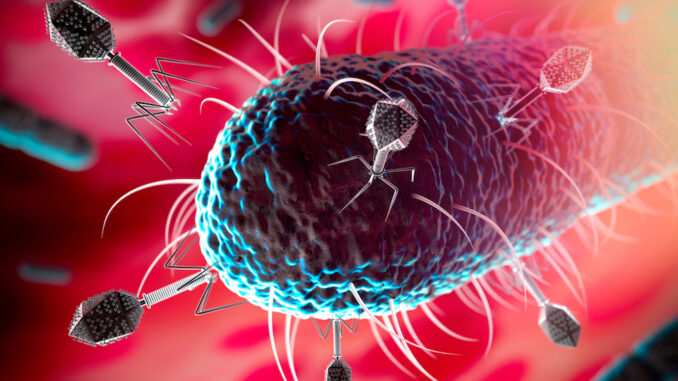
Pherecydes Pharma, a biotechnology company specializing in precision phage therapy to treat resistant and/or complicated bacterial infections, and BIOASTER, the first Institute for Technological Innovation in Microbiology, announce the implementation of research collaboration to use phages to treat bacteremia (blood infections) caused by the S. aureus, E. Coli and Pseudomonas aeruginosa bacteria.
Bacteremia, defined as the presence of viable bacteria in the bloodstream, represents the world’s second greatest cause of bacterial infection, with around 1.5 million deaths associated with this pathology per year1. In the United States alone, the CDC2estimates that up to 1.7 million people develop bacteremia every year. S. aureus is the most commonly identified pathogenic agent, both within and outside a hospital setting. Age-adjusted mortality assessments show that mortality due to S. aureusbacteremia is higher than that of AIDS, tuberculosis or viral hepatitis and similar to the mortality rate of breast or prostate cancer. E. Coli and Pseudomonas aeruginosa also represent major causes of antibiotic-resistant bacteremia.
Within the framework of this collaboration, Pherecydes Pharma will draw on BIOASTER’s excellence in developing preclinical models that are relevant to these infections in order to test the efficacy of the proprietary phages selected by Pherecydes Pharma in these pathologies.
Guy-Charles Fanneau de La Horie, Chairman of the Executive Board of Pherecydes Pharma, said:
“We are very pleased to be launching this new research program that is part of a broader partnership we are developing with BIOASTER, an institute whose excellence is globally recognized. Indeed, bacteremia represents major new applications for the development of our anti-S. aureus, Pseudomonas aeruginosa and E. Coli phages. The in-vivo demonstrations we anticipate thanks to this collaboration could eventually open up new markets to us with substantial commercial potential. This collaboration is in line with the strategy adopted by the Company that aims to expand the fields of applications of our existing assets”.
About BIOASTER Technological Research Institute
Created in 2012, following the French initiative of Technology Research Institutes, BIOASTER is a non-for-profit foundation developing a unique technological and innovative model to support the latest challenges in microbiology. In particular, BIOASTER uses and develops high value technological innovations that accelerate development of medical solutions for populations and personalized medicine.
The aim of BIOASTER is to bring together academic, industry and its capacities and specific knowledge to develop and execute high impact collaborative projects requiring industry compatible innovative technologies.
Key figures:
- 4 fields of expertise: antimicrobials, diagnostics, microbiota, vaccines
- BSL2 & BSL3 laboratories in Lyon and Paris
- 100+ employees, including 80% of scientific experts, 17 nationalities
- 250+ research contracts, involving 93 private partners, 54 public partners.
About Pherecydes Pharma
Founded in 2006, Pherecydes Pharma is a biotechnology company that develops treatments against resistant bacterial infections, responsible for many serious infections. The Company has developed an innovative approach, precision phage therapy, based on the use of phages, natural bacteria-killing viruses. Pherecydes Pharma is developing a portfolio of phages targeting 3 of the most resistant and dangerous bacteria, which alone account for more than two thirds of hospital-acquired resistant infections: Staphylococcus aureus, Escherichia coli and Pseudomonas aeruginosa. The concept of precision phage therapy has been successfully applied in several dozen patients in the context of compassionate use, under the supervision of the French National Agency for the Safety of Medicines (ANSM). Headquartered in Nantes, Pherecydes Pharma has a team of around twenty experts from the pharmaceutical industry, biotechnology sector and academic research.

